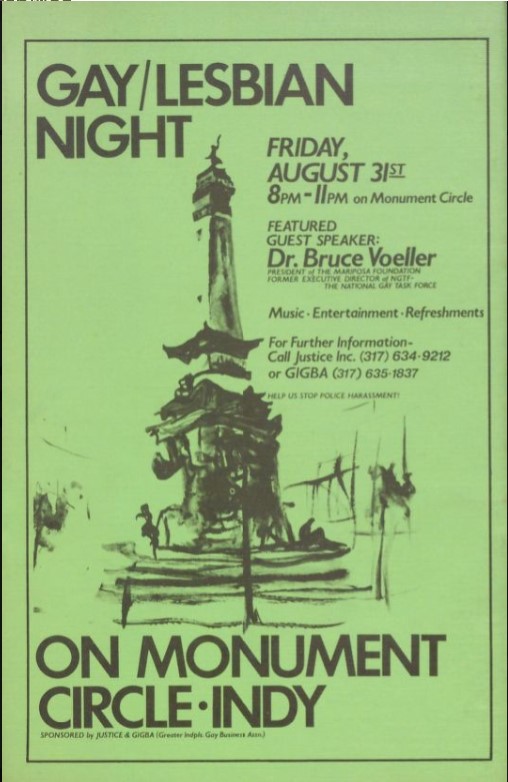In the summer of 1984, leaders of the LGBTQ community in Indianapolis organized what became known as the Gay Knights protests on . At the time, the gay and lesbian community used the Circle as a social gathering place, and the false idea that the community gathered there to troll for sexual partners circulated through the city’s political leadership. In response, the (IPD) created the Special Circle Unit that marginalized Indianapolis’s LGBTQ community through surveillance of cruising sites and harassment at safe spaces. A string of cases in which members of the IPD misused their authority surfaced. Leaders of the Indianapolis Gay/Lesbian Coalition (ILGC), which was founded in 1982 by gay activists , Kathy Sarris of , and others, organized rallies to protest the IPD harassment. Starting on Friday, July 20, 1984, hundreds of gay and lesbian Hoosiers participated in these protests weekly. In the pages of , a gay magazine published by Berg, the protesters became known as the “Gay Knights.”

Organizers strove to increase visibility for the community, hoping the show of solidarity would lead to a decrease in police harassment and increased commitment to solving the murders of LGBTQ individuals, which at the time were on the rise. In the heart of Indianapolis, attendees socialized, listened to local activists, learned about their rights, and registered to vote. They listened to speakers such as Sarris; of the Indiana Civil Liberties Union; former chairman of the National Gay Task Force Dr. Bruce Voeller; and Michael Jones, who was pressing charges against IPD’s Special Circle Unit for brutality and harassment. Although traffic was backed up for blocks on the Circle and a few spectators heckled attendees, IPD maintained order on the Circle at the gatherings.
At the last protest that occurred on August 31, 1984, Berg read a letter Mayor issued declaring a commitment to “an absence of anti-gay bias in all police matters.” This marked the first time an Indianapolis mayor had voiced a positive public remark on gays in the city. After Berg read the letter, attendees celebrated the milestone by chanting “‘Gay, Gay, Gay’” and dancing to disco.
The protests were the first large public gatherings where queer individuals openly exercised their First Amendment Constitutional right to freedom of public assembly in full view of the community at large in Indiana.

Help improve this entry
Contribute information, offer corrections, suggest images.
You can also recommend new entries related to this topic.